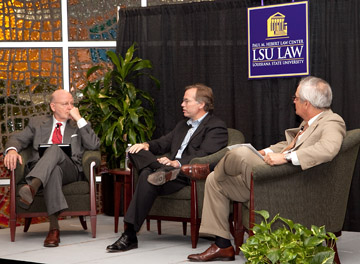
Steve Coll, a provocative investigative journalist and Pulitzer-prize winning author, provided an “on the ground assessment” of the current war and political situation in Afghanistan at events held with students, faculty, staff, and alumni on Friday, April 16. Coll is the author of numerous books, including Ghost Wars: The Secret History of the CIA, Afghanistan and Bin Laden, and most recently, The Bin Ladens: Arabian Family in the American Century. He spoke at the Law Center and to alumni at the annual Chancellor’s Council dinner. The events commemorated the 150 year LSU Sesquicentennial.
Michael A. Patterson (‘71), Chair of the LSU Law Center Chancellor’s Council for ‘09-‘10, welcomed some 200 guests to the Friday evening dinner. Patterson thanked the members of the Council for their financial support of the Law Center.
Chancellor Jack Weiss recognized the major gift donors who have supported the Law Center over the past year. Among them was Oliver “Rick” Richard (‘77), who was also presented the Distinguished Service Award for his leadership of the LSU Law Center Alumni Board of Trustees.
Coll engaged the audiences at both events with his riveting account of the history of the region and his insightful analysis of U.S. foreign policy following 9/11. He has recently returned from another trip to the embattled area, where he met with key leaders in the war effort.
“Do we have a coherent national strategy for dealing with radical Islam?” he asked the audiences. “No,” he concluded, “and we need one.” The war is not just a physical war, but a political one, said Coll, and the political situation is very unsettled. “The current conflict is at three levels: the counterinsurgency campaign; building the Afghan army; and negotiating with Pakistan to convince them to participate in a comprehensive settlement to get rid of the Taliban.”
In a physical sense, said Coll, our military can overwhelm the Taliban at any time with sheer force and numbers. “We can own any street corner in Afghanistan. The Taliban, as a structural matter, is pretty weak.” But according to Coll, the political equation is very unsettled. “We are not sure if we can roll the Taliban out … Pakistan also figures prominently in the equation,” said the author.
“I think we’re in a transition from traditional military action to a Kennedyesque-like way of dealing with persistent terrorism … You can’t win through deliberate violence that is now portrayed immediately on TV. That doesn’t mean you don’t use force. It means the use of drones over Pakistan, for instance … We now strategically know we live in a fish bowl. We’re always going to think carefully and survey our options for action.”
His opinions have been formulated based on years of field research and information gathering from both military personnel and friends in Afghanistan. Coll spent over 20 years as a foreign correspondent and managing editor for the Washington Post. He now serves as President and CEO of the New America Foundation and writes for The New Yorker Magazine. He was working on assignment during his latest trip to Afghanistan.
Coll spoke to students, faculty, and staffs of the Law Center and Manship School of Mass Communication earlier in the afternoon. The Conversation with Steve Coll was moderated by Chancellor Jack Weiss and Dean John Maxwell Hamilton of the Manship School.
Steve Coll is the author of six books, including most recently, The Bin Ladens (2008); Ghost Wars (2004); On the Grand Trunk Road: A Journey into South Asia (1994); Eagle on the Street, based on the Pulitzer Prize-winning account of the SEC’s battle with Wall Street (with David A. Vise, 1991); The Taking of Getty Oil (1987); and The Deal of the Century: The Break Up of AT&T (1986).
Coll’s professional awards include two Pulitzer Prizes. He won the first of these in 1990 for explanatory journalism in his series about the SEC, with David A. Vise. He was awarded his second in 2005 for Ghost Wars, honored in the general nonfiction category. Ghost Wars also won the Council on Foreign Relations Arthur Ross award; the Overseas Press Club award; and the Lionel Gelber Prize for the best book published on international affairs during 2004. Other awards include the 1992 Livingston Award for outstanding foreign reporting; the 2000 Robert F. Kennedy Memorial Award for his coverage of the civil war in Sierra Leone; and a second Overseas Press Club Award for international magazine writing. He lives in Washington, D.C.








